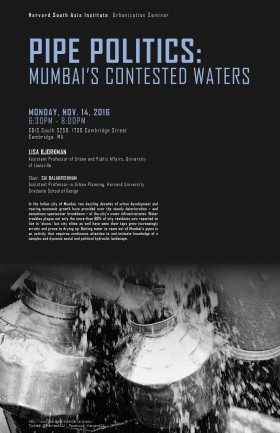Urbanization Seminar
Lisa Bjorkman, Assistant Professor of Urban and Public Affairs, University of Louisville
Chair: Sai Balakrishnan, Assistant Professor in Urban Planning, Harvard University Graduate School of Design
In the Indian city of Mumbai, two dazzling decades of urban development and roaring economic growth have presided over the steady deterioration – and sometimes spectacular breakdown – of the city’s water infrastructures. Water troubles plague not only the more-than 60% of city residents now reported to live in ‘slums,’ but city elites as well have seen their taps grow increasingly erratic and prone to drying up. The everyday risks of water shortage that infuse the city’s water infrastructures– risks that flow across class lines – are managed and mitigated through the forging and maintenance of elaborate knowledge-exchange networks. Getting water to come out of Mumbai’s pipes is an activity that requires continuous attention to and intimate knowledge of a complex and dynamic social and political hydraulic landscape. Ethnographic attention reveals how water is made to flow by means of intimate forms of knowledge and ongoing intervention in the city’s complex and dynamic social, political, and hydraulic landscape. The everyday work of getting water animates and inhabits a penumbra of infrastructural activity – of business, brokerage, secondary markets and socio-political networks – whose workings are transforming lives as well as reconfiguring and rescaling political authority in the city. Mumbai’s illegible and volatile hydrologies are lending infrastructures increasing political salience just as actual control over pipes and flows becomes contingent upon dispersed and intimate assemblages of knowledge, power, and material authority.

